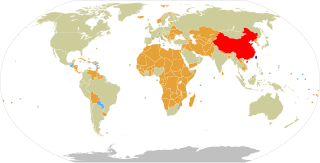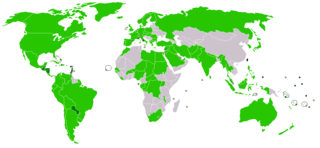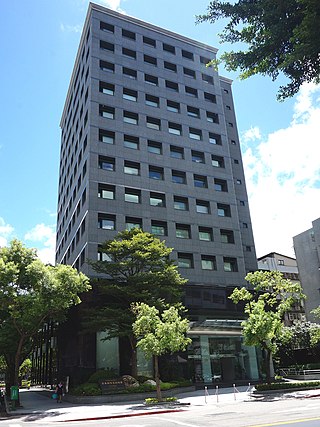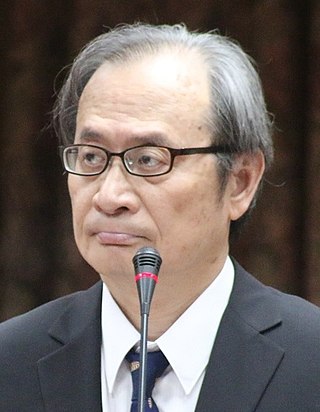Related Research Articles

Taiwan, formally known as the Republic of China (ROC), currently has formal diplomatic relations with 11 of the 193 United Nations member states and with the Holy See, which governs the Vatican City State, as of 12 March 2024. In addition to these relations, the ROC also maintains unofficial relations with 59 UN member states, one self-declared state (Somaliland), three territories, and the European Union via its representative offices and consulates. In 2021, the Government of the Republic of China had the 33rd largest diplomatic network in the world with 110 offices.

The Taipei Economic and Cultural Representative Office (TECRO), also known as Taipei Economic and Cultural Office (TECO), Taipei Representative Office (TRO) or Taipei Mission, is an alternative diplomatic institution serving as a de facto embassy or a consulate of the Republic of China to exercise the foreign affairs and consular services in specific countries which have established formal diplomatic relations with the People's Republic of China. The PRC denies the legitimacy of the ROC as a sovereign state and claims the ROC-controlled territories as an integral part of its territory. An exclusive mandate, namely One-China policy, requires that any country wishing to establish a diplomatic relationship with the PRC must first sever any formal relationship with the ROC. According to The Fletcher Forum of World Affairs, "non-recognition of the Taiwanese government is a prerequisite for conducting formal diplomatic relations with the PRC—in effect forcing other governments to choose between Beijing and Taipei." As a result, these countries only allow the ROC to establish representative offices instead of a fully-fledged embassy or consulate for the purpose of conducting practical bilateral relations without granting full diplomatic recognition.

Numerous states have ceased their diplomatic recognition of the Republic of China during the last 70 years, since the founding of the People's Republic of China. Under the One China policy, the ROC is recognized by 11 UN member states and Holy See with 59 UN member states and Somaliland maintaining unofficial cultural and economic relations.

After the United States established diplomatic relations with the People's Republic of China (PRC) in 1979 and recognized Beijing as the only legal government of China, Taiwan–United States relations became unofficial and informal following terms of the Taiwan Relations Act (TRA), which allows the United States to have relations with the Taiwanese people and their government, whose name is not specified. U.S.–Taiwan relations were further informally grounded in the "Six Assurances" in response to the third communiqué on the establishment of US–PRC relations. The Taiwan Travel Act, passed by the U.S. Congress on March 16, 2018, allows high-level U.S. officials to visit Taiwan and vice versa. Both sides have since signed a consular agreement formalizing their existent consular relations on September 13, 2019. The US government removed self-imposed restrictions on executive branch contacts with Taiwan on January 9, 2021.
The united front in Taiwan is an aspect of the Chinese Communist Party (CCP) and the Government of China's larger united front strategy, applied to Taiwan, to achieve unification. It relies on the presence of pro-Beijing sympathizers in Taiwan combined with a carrot-and-stick approach of threatening war with Taiwan while offering opportunities for business and cultural exchanges. According to officials of Taiwan's Mainland Affairs Council, the CCP has long relied on organized crime as part of its united front tactics in Taiwan.

The Japan–Taiwan Exchange Association, formerly known as Interchange Association, is an organization that represents the interests of Japan in Taiwan. In 2017, the current name was adopted.
A de facto embassy is an office or organisation that serves de facto as an embassy in the absence of normal or official diplomatic relations among countries, usually to represent nations which lack full diplomatic recognition, regions or dependencies of countries, or territories over which sovereignty is disputed. In some cases, diplomatic immunity and extraterritoriality may be granted.

The Macau Economic and Cultural Office is the representative office of Macau in the Republic of China. Its counterpart body in Macau is the Taipei Economic and Cultural Office in Macau.

Shen Lyu-shun was a Taiwanese diplomat who served at posts in the United States and Europe. He also served in the Department of North American Affairs in the Taiwanese Ministry of Foreign Affairs. He was best known as serving as the representative of the Republic of China to the United States from 2014 to 2016.
Events from the year 2015 in Taiwan, Republic of China. This year is numbered Minguo 104 according to the official Republic of China calendar.
The Taipei Economic and Cultural Office in Thailand is the representative office of Taiwan in Thailand, which functions as a de facto embassy in the absence of diplomatic relations.

Hsieh Shou-shing is a Taiwanese politician who served as minister of the Atomic Energy Council from 20 May 2016 to his removal from office on 11 January 2023.

Chile–Taiwan relations refer to the bilateral relations between the Republic of Chile and the Republic of China (Taiwan).

Harry Ho-jen Tseng is a Taiwanese diplomat who has served a deputy Minister of Foreign Affairs of Taiwan since 2020 and its representative to Canada since 2022.

Somaliland–Taiwan relations refers to the relationship between the Republic of Somaliland and the Republic of China (Taiwan). The two countries have no formal diplomatic relations, but they have established embassy-like representative offices in each other's capital. Taiwan's Ministry of Foreign Affairs refers to Somaliland as a country as of 2023, implying official recognition. Taiwan is currently the only country in the world to recognize Somaliland in this capacity.

Taiwan, officially the Republic of China, does not have official diplomatic relations with Lithuania, since Lithuania does not officially recognize the Republic of China and maintains a One-China Policy whereby it views the People's Republic of China as the sole legitimate government representing China, including Taiwan. Despite this, relations between Lithuania and Taiwan have grown closer in recent years. In 2021, Taiwan opened the "Taiwanese Representative Office in Lithuania". Meanwhile, Lithuania intends to open a representative office in Taiwan. The recent strengthening of relations between Lithuania and Taiwan in 2021 has been heavily opposed by the People's Republic of China (PRC), which doesn't recognize Taiwan. Notably, the PRC has downgraded its embassy in Lithuania to the status of a "chargé d'affaires" in protest. The PRC and Lithuania had previously maintained full diplomatic relations with one another since 1991.

The Representative Office in Taipei for the Moscow-Taipei Coordination Commission on Economic and Cultural Cooperation is the representative office of Russia in Taiwan, functioning as a de facto embassy in the absence of diplomatic relations. Its counterpart is the Representative Office in Moscow for the Taipei-Moscow Economic and Cultural Coordination Commission in Moscow.
The Taipei Representative Office in Ireland represents the interests of Taiwan in Ireland in the absence of formal diplomatic relations, functioning as a de facto embassy.
References
- ↑ Chen, Kelvin (9 November 2021). "Taiwan envoy to Ireland urges closer bilateral relations". Taiwan News. Retrieved 3 December 2021.
- ↑ "Taiwan official urges Ireland to reopen representative office in Taipei amid 'new EU relationship'". The Journal. 6 November 2021. Retrieved 3 December 2021.
- ↑ O'Sullivan, Neil (26 January 2021). "We need closer links to Taiwan". The Irish Times. Retrieved 3 December 2021.
- ↑ "Taipei Representative Office in Ireland". Taipei Representative Office in Ireland. 30 September 2021. Retrieved 3 December 2021.